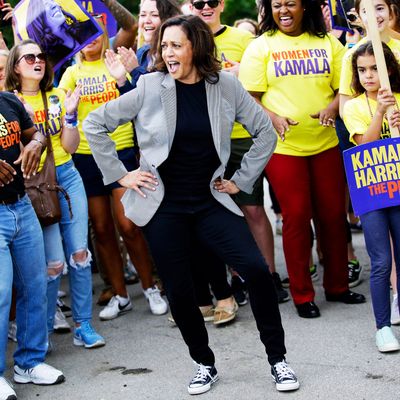
Most of the buzz surrounding the release over the weekend of the latest gold-standard Iowa poll from Ann Selzer (for the Des Moines Register, CNN, and Mediacom) involved the candidates who have long been at the top of the heap. In particular, Selzer showed Elizabeth Warren (22 percent) moving ahead of Joe Biden (20 percent), and having double the level of support as third-place Bernie Sanders (11 percent). No other candidate was in double figures, and fourth-placed Pete Buttigieg (9 percent) lost six points since the last Iowa poll in June. So the bottom line was continued churn among the Big Three, with Warren showing the most momentum, but with not much shaking lower on the long list of candidates.
But Selzer also compiled favorable/unfavorable ratios for the candidates, and a look at them may help to discern which of today’s bottom-feeders have true dark horse potential, and which are probably going nowhere fast. Nine active candidates have positive net favorability numbers among likely caucus-goers:
Warren +58
Buttigieg +56
Harris +39
Booker +38
Biden +37
Klobuchar +30
O’Rourke +28
Sanders +22
Yang +6
But nine others are underwater:
Castro -1
Bennet -3
Bullock -5
Gabbard -5
Steyer -5
Sestak -14
Ryan -15
Delaney -17
Williamson -39
Two of the candidates with net negative favorability ratings (Castro and Steyer) have qualified for the October debates, and one other (Gabbard) is one qualifying poll away from making the stage with eight days left before the deadline.
Yes, this is just one poll from one state, albeit a highly regarded poll from the single-most important state, but it provides some evidence that below the Big Three are five who are making enough of a positive impression on Iowa Democrats that a late surge isn’t at all out of the question. And actually, all of the those five have higher net favorability numbers than Bernie Sanders, which increases the bad news he got from Selzer.
Not many pollsters offer favorability/unfavorability ratings for the entire field, but one national tracking poll that does, Morning Consult, offers a somewhat different take, from findings collected just after the September debate. It shows only one candidate, Marianne Williamson, having an underwater favorability ratio (-6). Here’s the rest of the field (Morning Consult didn’t bother to poll Joe Sestak):
Sanders +59
Biden +54
Warren +52
Harris +38
Buttigieg +33
O’Rourke +31
Booker +30
Yang +22
Klobuchar +21
Castro +11
Gabbard +11
Steyer +8
Bennet +6
Bullock +6
Delaney +3
Ryan +1
The rankings are pretty similar, with the exception of a big difference of opinion over Bernie Sanders (the most popular candidate nationally, per MC, but only the eighth most popular in Iowa, per Selzer), and some less dramatic divergences over candidates in the middle of the pack like Yang and Klobuchar (much more popular, unsurprisingly, in next-door Iowa).
At this point you’d have to figure October-debate non-qualifiers Bennet, Bullock, Delaney, Ryan, and Sestak are pretty toasty, with possible qualifier Gabbard and qualifiers Castro and Steyer not looking so hot, either. Yang’s on the bubble, as is Klobuchar, though her relative strength in Iowa could keep her aloft. But if you’re looking for a dark horse at this point, it’s probably going to be from the group that includes Booker, Buttigieg, Harris, and O’Rourke. So in your mental road-map of the race you should probably add a Little Four to the Big Three. And if Cory Booker’s campaign isn’t bluffing in its recent distress signal about fundraising, the list of plausible dark horses could soon shrink further.






























